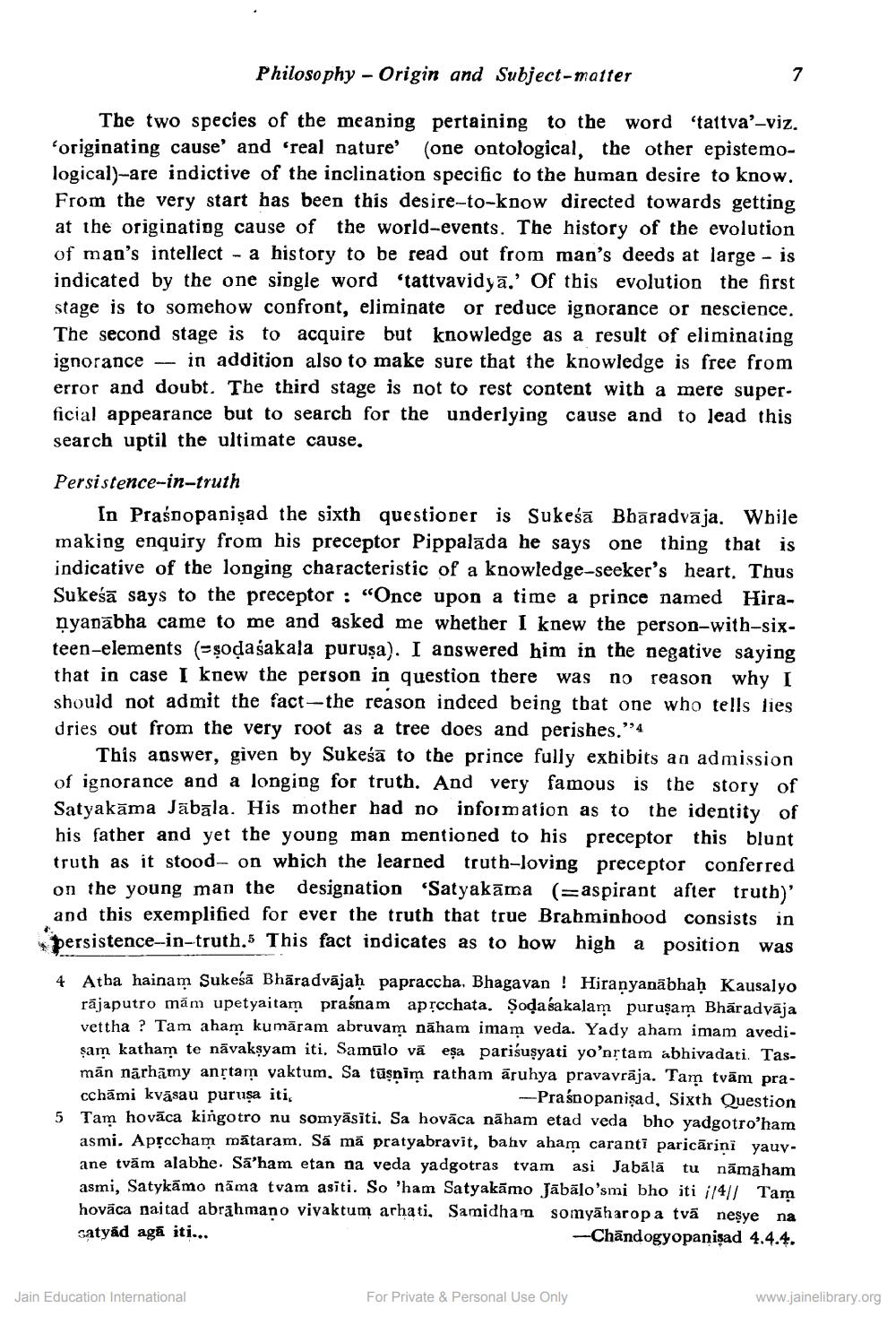________________
Philosophy - Origin and Subject-matter
The two species of the meaning pertaining to the word "tattva’-viz. 'originating cause' and 'real nature' (one ontological, the other epistemological)-are indictive of the inclination specific to the human desire to know. From the very start has been this desire-to-know directed towards getting at the originating cause of the world-events. The history of the evolution of man's intellect - a history to be read out from man's deeds at large - is indicated by the one single word 'tattvavidyā.' of this evolution the first stage is to somehow confront, eliminate or reduce ignorance or nescience. The second stage is to acquire but knowledge as a result of eliminating ignorance -- in addition also to make sure that the knowledge is free from error and doubt. The third stage is not to rest content with a mere superficial appearance but to search for the underlying cause and to lead this search uptil the ultimate cause.
Persistence-in-truth
In Praśpopanişad the sixth questioner is Sukeśa Bhāradvāja. While making enquiry from his preceptor Pippalada he says one thing that is indicative of the longing characteristic of a knowledge-seeker's heart. Thus Sukešā says to the preceptor : "Once upon a time a prince named Hiranyanābha came to me and asked me whether I knew the person-with-sixteen-elements (-sodaśakala puruşa). I answered him in the negative saying that in case I knew the person in question there was no reason why I should not admit the fact - the reason indeed being that one who tells lies dries out from the very root as a tree does and perishes.”
This aaswer, given by Sukeśā to the prince fully exhibits an admission of ignorance and a longing for truth. And very famous is the story of Satyakāma Jābāla. His mother had no information as to the identity of his father and yet the young man mentioned to his preceptor this blunt truth as it stood- on which the learned truth-loving preceptor conferred on the young man the designation 'Satyakāma (=aspirant after truth)' and this exemplified for ever the truth that true Brahminhood consists in persistence-in-truth.5 This fact indicates as to how high a position was
4 Atba hainam Sukeśa Bhāradvājaḥ papraccha. Bhagavan ! Hiranyanābhah Kausalyo
rājaputro mām upetyaitam praśnam aprcchata. Șoda sakalam puruşam Bhāradyāja vettha ? Tam aham kumāram abruvam nāham imam veda. Yady aham imam avedişam katham te nāvakşyam iti, Samulo vā esa parisuşyati yo'nrtam abhivadati. Tasmān närhamy anrtam vaktum, Sa tūşnim ratham āruhya pravayrāja. Tam tvām pracchāmi kvāsau puruşa iti,
-Praśnopanişad, Sixth Question Tam hovāca kingotro nu somyāsiti. Sa hovāca nāham etad veda bho yadgotro'ham asmi. Aprccham mătaram. Să mă pratyabravit, bahy aham caranti paricārini yauyane tvām alabhe. Sā'ham etan na veda yadgotras tvam asi Jabālā tu nāmāham asmi, Satykāmo nāma tvam asīti. So 'ham Satyakāmo Jābālo'smi bho iti 1/4/1 Tam hovāca naitad abrahmano vivaktum arhati. Samidhan somyāharopa tvā nesye na satyád agā iti...
-Chandogyopanişad 4.4.4.
Jain Education International
For Private & Personal Use Only
www.jainelibrary.org




